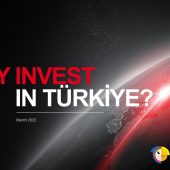This is a high-growth industrial sector for the nation. In 2020, Turkey’s information and communication technology (ICT) industry will be worth 189 billion Turkish liras ($26.9 billion). This industry increased by 22% year on year (TUBISAD). The number was much higher than the forecasted annual growth rate of 5-10 % for the year. It shows a great future of Information Technology in Turkey.
Noting that the sector’s size increased by 15% each year on average between 2016 and 2020, the study said that the exchange rate impact and electronic communications had a major role in last year’s development.
In 2020, the Turkish ICT sector’s exports totaled 10.5 million liras ($1.5 million), with 143,000 people employed.
The category of information technology software accounted for the lion’s share of overall exports, accounting for 8.7 million Turkish liras ($1.2 million).
Turkey’s youthful population (which is projected to grow even more in the future years), planned large-scale projects, the government’s 2019 to 2023 strategic plan, 5G efforts, and a stronger emphasis on meeting growing consumer expectations all support further possibilities in this industry.
1 – Future of Information Technology in Turkey:
The market for Information Technology in Turkey was worth $26.8 billion in 2019, $17 billion went toward telecommunications, and $9.9 billion went toward information technology. They include hardware, software, and Information Technology in Turkey services. In 2019, Turkey exported $1.1 billion in connected goods and services, employing 143,000 people. Spending in the ICT industry is projected to increase due to a big domestic market and significant potential.
2 – Infrastructure for Data:
Broadband internet is available in 88 % of homes, with 75 % of those aged 16 to 74 using it. Fixed broadband connects around 12 million homes to the internet, while mobile broadband connects 87 %. A staggering 98% of mobile phone subscribers are on broadband, with an average of 3 GB of data used every month.
3 – Use of Social Media:
There are 54 million active social media users in Turkey, which is an increase of 2 million over last year. Following YouTube, Instagram, and Facebook in popularity are the three most popular social networks. The Parliament of Turkey approved legislation on August 6, 2020, which may limit significantly the access to platforms (with more than 1 million daily users) that refuse to delete objectionable content required by the government. One of the criteria of the legislation is that social media companies have at least one representative in the nation.
4 – Hardware and software for information technology:
IT hardware expenditure, like most retail spending, dropped somewhat last year, owing in part to smartphone cannibalization of tablet sales. Spending on software and services was more robust, with certain sectors experiencing a significant increase, such as cloud computing, as cloud providers extended their presence and the solutions on offer and Turkish companies grew more aware of the advantages of moving to the cloud. Major software categories included ERP and CRM. Nevertheless, the most significant contribution of conventional IT sales was systems integration, consulting, and programming.
- Financial services (online, mobile banking payments, e-commerce platforms),
- Insurance industry (Insuretech),
- 5G technologies-IOT services, network infrastructure, and support systems,
- Cloud computing services,
- Mobile health, mobile computing, data centers, and disaster recovery and recovery from disasters.
5 – Telecommunications:
The Turkish telecom industry is mature, yet there is still potential for expansion. With almost 100 % penetration in the mobile industry, subscriber growth has been slow, but there is a significant demand for high-speed internet services. 90 % of the 81.6 million mobile phone users currently use smartphones, and ownership is quickly increasing. 4G will continue to expand until 5G takes over in 2022. Türk Telekom/Avea, which holds a 29 % market share, and Vodafone are the main GSM providers in Turkey. It is true that 81% of consumers used 4.5G (LTE) technology in 2019, while 80% of consumers used 4.5G (LTE) in 2016. E-commerce, mobile internet, mobile banking services, and mobile television services have grown as a result of 4.5G adoption, providing attractive business prospects for investors. New technological investments and attempts to migrate to 5G technology will hasten industry growth.
Operators are investing in sophisticated networks and collaborating with suppliers such as Nokia, Ericsson, and Huawei as they move to 5G technology. In order to reach its goals of becoming a leader in 5G adoption, Turkish telecom companies have invested in their infrastructure as they prepare to undertake smart city projects and the Internet of Things (IoT). It is rapidly expanding, generating new revenue sources and business areas thanks to technologies such as LTE, IPTV, online services, content and media services, e-commerce, customized services, music downloads, games, multi-player, and video services.
6 – Smartphone Usage:
Smartphone users in Turkey frequently swap their phones for new models, resulting in continuous growth in the handset industry. Apple, Huawei, Oppo, and Vivo have all had very successful smartphones in recent years. Samsung continues to dominate the mobile and wireless market, however. GSM mobile phone sets with broadband internet connections. They are ideal for video downloading, and live streaming will help to develop in this industry.
ZTE, Nokia, Northern Telecom, Alcatel, Siemens, Ericsson, and NEC are among the companies that supply the majority of fixed-line switches and other telecommunications equipment. In Turkey, prominent network providers include Nokia, Ericsson, and Huawei. Shortly, U.S. companies could offer competitive software solutions for customer databases, staff management, emergency call services, and intelligent network operations centers. The major GSM switch and base station providers include Cisco, Motorola, Nokia, Ericsson, and Siemens. Companies in the United States may compete in the development of new software products needed by GSM cellular carriers in order to offer new services to their customers and enhance corporate and client management.
- M2M communication/IoT.
- Edge Computing Systems.
- Public Investments & e-Government.
- Cloud/Data Centers.
- Consumer electronics.
- Robotics supported by Artificial Intelligence/Augmented Reality applications (IPTV).
- E-sports.
- Cybersecurity solutions.
- Communication Technologies/5G-related tech and services/Fiber optic solutions.
- Gaming.
7 – 5G in Turkey :
5G, a Turkish government priority, is drawing investments in the telecommunications industry. The government set aside $5 billion from Information Technology in Turkey’s budget for this aim in 2019. 5G commercialization will not begin until early 2021, with just a small number of customers in the first year, but continuous growth will follow. Customers in Istanbul, Ankara, Izmir, and Antalya will first be switched to 5G, and 4G will remain prevalent elsewhere in Turkey. By 5G, the main industries targeted will be automotive, entertainment, energy, healthcare, and agriculture.
Turkish authorities have partnered with non-government organizations (NGOs) and universities to create the ‘New Generation Mobile Communication Technologies Turkey (5GTR) Forum,’ which has been set up to meet market 5G requirements. Localization and cooperation between vertical sectors are aimed at improving. A variety of private companies and organizations attend those meetings, including Ericsson, Vestel, Vodafone, Turkcell, Turk Telekom, Huawei, ZTE, Ulak Communication, the Telecommunications Businessmen’s Association of Turkey, and the Technology Development Foundation of Turkey.
8 – Fiberoptics:
Turk Telekom, TTNet, and other Internet service providers are investing in fiber optic infrastructure to gain commercial traction. As stated in its 2019 to 2023 strategy plan, Turkey’s regulator is likewise eager to guarantee increased internet availability. The broadband industry presently has 16 million subscribers. But this figure is projected to rise to 23 million over the next ten years.
9 – Cybersecurity:
In the market, preventing attacks and viruses, as well as cyber governance, managing identities, certificates, and ensuring information security on mobile devices is a top priority. To combat cyber risks, the government has boosted its spending on hardware and software. The Turkish National Police, the Turkish Transport and Infrastructure Ministry, the Turkish Ministry of Justice and Interior, and the Turkish military will continue upgrading their cybersecurity technologies in order to implement these measures. Several state institutions and enterprises have been offered cybersecurity protection by SOMEs (Cyber Incident Response Teams).
Turkey’s digital transformation and improvement the Information Technology in Turkey is accelerating. The Turkish government’s commitment to this sector’s growth is noteworthy. 5G trials are now ongoing, with cloud solutions, services, and devices in industries. They include finance, healthcare, and media expected to gain from 5G technology development. Turkey is pushing the use of leading-edge Information Technology in Turkey’s systems. It is a result of implementing EU regulations and complying with EU norms. Local telecommunications companies are accelerating IoT solutions and smart city initiatives. In the long term, cybersecurity will also provide possibilities. Turkey is in a high-risk area for cyberattacks, raising the potential of a high-impact assault on vital infrastructure.













